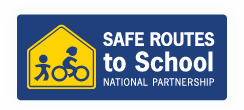Strong Towns, one of my favorite wonky planning blogs, recently posted this story explaining how Road Funding as a Prisoner's Dilemma. I expanded on what they wrote a bit to focus on how road funding is particularly problematic for people who walk and bike. Here goes:
We've all had that moment at the end of a night out to dinner with friends when the last drink has been guzzled and it's time to split the bill. Many a sitcom episode has hinged over whether the bill should be split evenly between all parties, or painstakingly calculated on a who-had-which-entree basis.
It turns out that the way we think about paying the dinner bill is remarkably similar to how we think about paying for roads.
Imagine that you're out to dinner with three other friends. It's a small table, so you can all see what the other person orders. When the bill comes, it's easy enough to split things up in a way that makes it "fair" for everyone. If Friend A had an extra glass of wine, she knows her friends will notice if she doesn't chip in a few more dollars. If Friend B forgets to add in the tax, it will be obvious to everyone. Because of this, no one at the table is tempted to have more than they want or can afford to pay for.
Now imagine that you're out to dinner with a large group of friends and acquaintances, including a few people you've never met before. Since the table is huge, you can't really see what the people at the other end are ordering, but you can tell right away that it's going to be too complicated to figure out individual checks. You resign yourself to splitting the bill evenly 23 ways, regardless of your personal menu choices. Because of this, you order a few extra drinks so that you're sure you get your money's worth. You wake up the next morning with a nasty hangover, and a lingering sense of injustice. Even though you didn't really want that fifth beer, drinking it was the only way you could think of to get your fair share.
We fund roadways as if we're all sitting at a really big dinner table. A large part of roadway funding comes from things like sales taxes, property taxes, or development fees. None of these have a direct relationship to driving, so they don't have a strong influence on our travel choices--just as what I eat for dinner at the big table doesn't have a direct relationship to my bill.
The problem is that my steak dinner isn't free, and neither is the one that the person at the other end of the table ate. Driving does impose real costs on our communities, in the form of congestion, pollution, and poor traffic safety. But since no one is held directly accountable for these costs, we have an incentive to drive more than we should. I eat more than I really want to at the big group dinner, because the alternative is paying the price of a bottle of wine when all I had to drink was water. And that's not just bad for me--since everyone at the table does the same thing, we all end up overeating and spending more on dinner than we wanted to.
So who's the pedestrian in all of this? The pedestrian is the vegetarian at the table. She's the person who is always going to end up overpaying for dinner, because her salad is never going to cost as much as her neighbor's roast chicken. As vulnerable road users, pedestrians bear a disproportionate burden of the costs of driving. But they pay the same bill as everyone else in the form of sales taxes, income taxes, and property taxes.
This bothers me at the policy table almost as much as it bothers me at the dinner table (can you tell I'm the vegetarian?). Transportation planners have long touted direct fees as the best way to ensure drivers pay the true cost of their travel choices. California is finally getting serious about implementing the idea. Hopefully our decisionmakers will get on board. Otherwise, we're all in for a serious hangover.










No comments:
Post a Comment